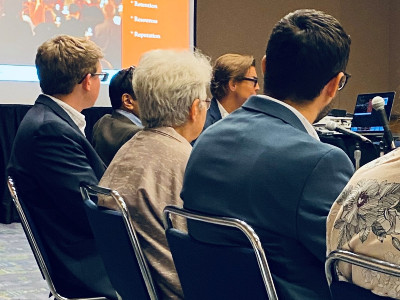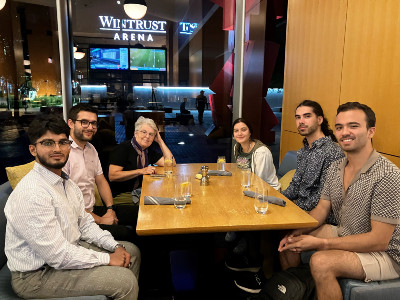Hendricks Chapel Dean, Chaplains and Students Attend Parliament of the World’s Religions
Representatives from Hendricks Chapel recently attended the Parliament of the World’s Religions, held in August in Chicago. This year’s theme was “A Call to Conscience: Defending Freedom and Human Rights.” More than 7,000 participants from more than 95 countries, representing more than 210 faith traditions, attended.
The Hendricks Chapel delegates included Dean Brian Konkol; Buddhist Chaplain JoAnn Cooke; Muslim Chaplain Amir Duric; Baptist Chaplain Devon Bartholomew; Hindu Chaplain Sanjay Mathur and students Elan Fullmer ’24, Olivia Matz, Joseph Patrick Zoll G’23 and Mian Muhammad Abdul Hamid ’25, who serves as convenor of the Hendricks Chapel Student Assembly of Interfaith Leaders.

Brian Konkol and the chaplains led a workshop for those engaged in religious and spiritual programs and services alongside young adults and university communities.
The Parliament of the World’s Religions is widely known as the premier interfaith global convening of civic, spiritual and grassroots changemakers. The organization was founded through a mission to cultivate harmony among the world’s religious and spiritual communities and to foster their engagement with the world and its guiding institutions to address the critical issues of our time. The Parliament was incorporated in 1988 to carry out a tradition and legacy that dates back to the 1893 World’s Columbian Exposition in Chicago, where the historic first convening of the World’s Parliament of Religions created a global platform for engagement of Eastern and Western religions.
Modern Parliament convenings have attracted participants from more than 200 diverse religious, Indigenous and secular beliefs to its international gatherings in Chicago (1993), Cape Town (1999), Barcelona (2004), Melbourne (2009), Salt Lake City (2015), Toronto (2018) and virtually (2021). These Parliament convenings are regarded as the world’s oldest, largest and most inclusive gatherings of the global interfaith movement. Nearly 60,000 people across the world have convened at a Parliament in an enduring commitment to justice, peace and sustainability through the lens of interfaith dialogue and cooperation.
Global leaders such as His Holiness the 14th Dalai Lama, His All Holiness Ecumenical Patriarch Bartholomew, United Nations Messenger of Peace Jane Goodall, Nobel Peace Laureates Desmond Tutu and Shirin Ebadi, and President Jimmy Carter have addressed the Parliament convenings throughout its history.

Chaplains Amir Duric and JoAnn Cooke and students enjoy dinner during the Parliament of the World’s Religions.
“To participate in the most recent Parliament of the World’s Religions was truly an honor, and to share the experience with chaplains and students was a tremendous joy,” says Konkol. “I believe we from Syracuse University contributed a great deal to the gathering. We definitely learned a great deal, and I am fully convinced that we are ready and committed to apply our learning into the future.”
Cooke says that from her perspective, the best part of the gathering was the people she encountered. “If you closed your eyes and imagined a world where a diverse group of people could come together peacefully with a deep appreciation and respect for each other, and then opened them only to see that what you had imagined had come true, you would be at the Parliament of World Religions,” says Cooke. “It was an inspiration of hope to move about and feel complete freedom to be who you are. There were many good workshops and programs, but where I learned the most was in the small conversations with the person sitting next to me, or a kindred spirit searching for the same room as me, or someone sitting on the ground across from me at the wonderful lunch so generously offered by the Sikh community.”
Konkol and the chaplains led a workshop for those engaged in religious and spiritual programs and services alongside young adults and university communities. “As university chaplains, our rootedness to our individual faiths provides a broad reach of care and support for our university community,” says Bartholomew. “I really enjoyed the time that I got to spend with my colleagues.”
Duric, Hendricks Chapel’s Muslim chaplain, says this year’s theme, focused on freedom and human rights, was critically important. “In the time when we learn about and witness injustices in our surroundings and around the world, the theme of freedom and human rights is pivotal,” he says. “Sessions, panels and activities at the Parliament inspired us to reflect on our role, individually and collectively, as humanity to address issues of injustice and contribute to freedom and fundamental human rights.”
“I am glad that a group of our Syracuse University students attended the Parliament and witnessed the world in all its diversity in one place. I am also grateful and honored that I was a part of our Hendricks Chapel team that contributed to this Parliament by putting together a panel discussion and sharing with others what we at Syracuse University do to prepare and educate the next interfaith generations,” he says.
Mian Muhammad Abdul Hamid, a junior in the School of Information Studies, immersed himself in the experience and partook in all the Parliament had to offer, from prayer services to informational booths to communal meals. “What really amazed me during the time I was there was the fact that we were all like-minded people (in terms of having a passion for faith and religion) in one big convention, all respecting one another,” he says.
“By participating in the Parliament, we at Hendricks Chapel are better equipped to accompany students of diverse religious, spiritual, moral and ethical identities and experiences,” says Konkol. “Through our collective commitment to advance academic excellence at a university welcoming to all, we at the spiritual heart of Syracuse University are now better empowered to build community, explore belief, offer guidance, lead rituals, facilitate cooperation and provide care.”

